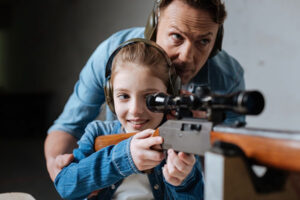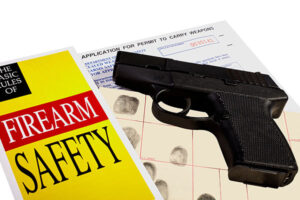Firearms can be a polarizing subject among friends, family, and co-workers. Some well-meaning people have major apprehensions and aversions—along with opinions—about guns and gun owners.
Here are some tips and practices you can use that might make it easier for gun owners to state their opinions, dispel misconceptions, while still keeping a respectful and non-adversarial tone that can save or foster relationships.
And, it can help those unfamiliar with firearms find a path to self-protection or shooting sports without feeling intimidated.

 CHILDREN
CHILDREN
We have a full article at this link about how you might want to introduce children to firearms and the concepts that surround them.
Suffice it to say that there is an evolution of appropriate responsibility, also guided by a child’s intellectual ability to understand certain concepts, that will help to educate and inform children about firearms as they grow toward adulthood.
PEOPLE FROM ANTI-GUN BACKGROUND/PEOPLE WITH NO GUN KNOWLEDGE AT ALL
Whether you’re dealing with someone who has a strong anti-gun bias, or someone who has absolutely no knowledge of guns at all, there are some straightforward, simple rules that can help to foster understanding.

Demeanor
Even though conversations about firearms can sometimes be contentious, the first thing you’ll want to do is keep your cool. Make sure you’re the level-headed person in the room. That will naturally take the “heat” out of any exchange of information, and reinforce your position as open-minded and clear thinking.
Other ways your demeanor can help facilitate your goal of helping others understand your position are:
 No insults. An insult might make you feel good for a second, but it’ll make the person you’re talking to resistant forever.
No insults. An insult might make you feel good for a second, but it’ll make the person you’re talking to resistant forever.
Persuade with politeness. While sometimes easier said than done, remaining civil will not only earn you respect, it will give your thoughts and assertions more credibility.
Acknowledge their concerns. Believe it or not, there are some real, tangible concerns regarding firearms that you may actually share with those you’re conversing with. When someone says something reasonable, acknowledge it. Show them you are reasonable. Create common ground.
Assertions, not aggressions. When your beliefs are statements that are free of casting aspersions toward those who disagree with you, they’re easier to accept and harder to dispel both at the same time. Even better when your assertions are supported by tangible facts.

 Stress gun safety and responsibility
Stress gun safety and responsibility
After all, you don’t want the wrong people to have firearms, either. Also, as a responsible gun owner, you know that safety is the foundation of any gun use. You can point out that Concealed Carry permits require safety knowledge—and that the industry at large has been promoting it for years. This is an area that’s tailor-made for common ground.
Stay out of politics
As you’ve probably noticed, people are firmly entrenched in political parties and their surrounding beliefs these days. Keeping things non-political will just help to avoid the conversation becoming layered with a number of unrelated issues that can only inflame the discussion.

Keep the conversation going, tactfully, when possible
Often this conversation will not reach fruition in one sitting. But, that’s not necessarily a bad thing. It allows both parties time to consider the other person’s point of view. Whenever the chance tactfully arises, keep the narrative going on your part—and on the part of the other person.
“I” statements
When you state your beliefs starting with “I” (as in “I believe in the 2nd Amendment”) you are personalizing your argument. You don’t want to be responsible for anyone else’s beliefs. You also want the person you’re talking with to deal with you and your beliefs directly. In addition, it helps avoid stating the other person’s argument with “you” statements (as in “You just don’t want people to have guns”.)

 Invite them to the range with you
Invite them to the range with you
Here’s a part of your presentation you’ll want to work up to. Wait until you’ve had enough discussion and exchange of ideas that seems appropriate. Start your interaction with just conversation. No guns present. No gun handling. Then, if the other person is willing, perhaps some basic unloaded gun handling in private. Introduce the actual firearm slowly. Help to dispel what might be intimidating to the first-time gun user.
One of the best questions you can ask is “Have you ever fired a gun?” If the answer is no, that’s the perfect opportunity to ask them if they’d like to accompany you to a shooting range. Actually handling a firearm, learning about its safe use, and enjoying the experience of shooting at a target has convinced many a person that an argument just couldn’t persuade. It’s important to NOT shoot at human or animal shaped targets on this first outing for obvious reasons.
With these simple ground rules in mind, be prepared with facts, keep your cool, speak with kindness, and invite your friend, family member, co-worker, or acquaintance to learn more for themselves.
Even if you don’t convince them to become a dyed-in-the-wool firearms supporter, you will have at least built a bridge of understanding while demonstrating that calm, rational thinkers inhabit the world of gun ownership.

